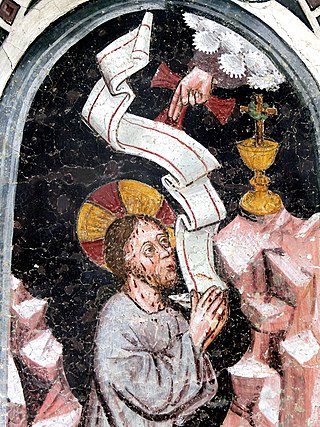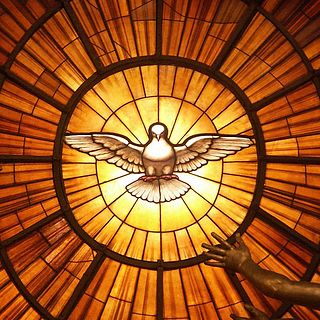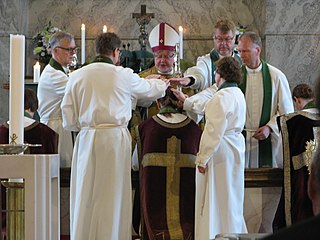Related Research Articles

Anointing of the sick, known also by other names such as unction, is a form of religious anointing or "unction" for the benefit of a sick person. It is practiced by many Christian churches and denominations.

Faith healing is the practice of prayer and gestures that are believed by some to elicit divine intervention in spiritual and physical healing, especially the Christian practice. Believers assert that the healing of disease and disability can be brought about by religious faith through prayer or other rituals that, according to adherents, can stimulate a divine presence and power. Religious belief in divine intervention does not depend on empirical evidence of an evidence-based outcome achieved via faith healing. Virtually all scientists and philosophers dismiss faith healing as pseudoscience.
Speaking in tongues, also known as glossolalia, is an activity or practice in which people utter words or speech-like sounds, often thought by believers to be languages unknown to the speaker. One definition used by linguists is the fluid vocalizing of speech-like syllables that lack any readily comprehensible meaning. In some cases, as part of religious practice, some believe it to be a divine language unknown to the speaker. Glossolalia is practiced in Pentecostal and charismatic Christianity, as well as in other religions.
Pentecostalism or classical Pentecostalism is a Protestant Charismatic Christian movement that emphasizes direct personal experience of God through baptism with the Holy Spirit. The term Pentecostal is derived from Pentecost, an event that commemorates the descent of the Holy Spirit upon the Apostles and other followers of Jesus Christ while they were in Jerusalem celebrating the Feast of Weeks, as described in the Acts of the Apostles.

A spiritual gift or charism is an extraordinary power given by the Holy Spirit. These are believed by followers to be supernatural graces that individual Christians need to fulfill the mission of the Church. In the narrowest sense, it is a theological term for the extraordinary graces given to individual Christians for the good of others and is distinguished from the graces given for personal sanctification, such as the Seven Gifts of the Holy Spirit and the fruit of the Holy Spirit.

The laying on of hands is a religious practice. In Judaism semikhah accompanies the conferring of a blessing or authority.
The charismatic movement in Christianity is a movement within established or mainstream denominations to adopt beliefs and practices of Charismatic Christianity, with an emphasis on baptism with the Holy Spirit, and the use of spiritual gifts (charismata). It has affected most denominations in the United States, and has spread widely across the world.
In Christian theology, baptism with the Holy Spirit, also called baptism in the Holy Spirit or baptism in the Holy Ghost, has been interpreted by different Christian denominations and traditions in a variety of ways due to differences in the doctrines of salvation and ecclesiology. It is frequently associated with incorporation into the Christian Church, the bestowal of spiritual gifts, and empowerment for Christian ministry. Spirit baptism has been variously defined as part of the sacraments of initiation into the church, as being synonymous with regeneration, or as being synonymous with Christian perfection. The term baptism with the Holy Spirit originates in the New Testament, and all Christian traditions accept it as a theological concept.
Signs and wonders refers to experiences that are perceived to be miraculous as being normative in the modern Christian experience, and is a phrase associated with groups that are a part of modern charismatic movements and Pentecostalism. This phrase is seen multiple times throughout the Bible to describe the activities of the early church, and is historically recorded as continuing, at least in practice, since the time of Christ. The phrase is primarily derived from Old and New Testament references and is now used in the Christian and mainstream press and in scholarly religious discourse to communicate a strong emphasis on recognizing perceived manifestations of the Holy Spirit in the contemporary lives of Christian believers. It also communicates a focus on the expectation that divine action would be experienced in the individual and corporate life of the modern Christian church, and a further insistence that followers actively seek the "gifts of the Spirit".
In Christian theology, the gifts of healing are among the spiritual gifts listed in 1 Corinthians 12. As an extraordinary charism, gifts of healing are supernatural enablements given to a believer to minister various kinds of healing and restoration to individuals through the power of the Holy Spirit. In the Greek of the New Testament, both the words gift and healing are plural.

The Catholic Charismatic Renewal (CCR) is a movement within the Catholic Church that is part of the wider charismatic movement across historic Christian churches.
Ex opere operato is a Latin phrase meaning "from the work worked" that, in reference to sacraments, signifies that they derive their efficacy not from the minister or from the recipient, but from the sacrament considered independently of the merits of the minister or the recipient. According to the ex opere operato interpretation of the sacraments, any positive effect comes not from any human worthiness or faith, but from the sacrament as an instrument of God.
The Neo-charismaticmovement is a movement within evangelical Protestant Christianity that is composed of a diverse range of independent churches and organizations that emphasize the current availability of gifts of the Holy Spirit, such as speaking in tongues and faith healing. The Neo-charismatic movement is considered to be the "third wave" of the Charismatic Christian tradition which began with Pentecostalism, and was furthered by the Charismatic movement. As a result of the growth of postdenominational and independent charismatic groups, Neo-charismatics are now believed to be more numerous than the first and second wave categories. As of 2002, some 19,000 denominations or groups, with approximately 295 million individual adherents, were identified as Neo-charismatic.
Divine grace is a theological term present in many religions. It has been defined as the divine influence which operates in humans to regenerate and sanctify, to inspire virtuous impulses, and to impart strength to endure trial and resist temptation; and as an individual virtue or excellence of divine origin.

Cessationism versus continuationism involves a Christian theological dispute as to whether spiritual gifts remain available to the church, or whether their operation ceased with the apostolic age of the church. The cessationist doctrine arose in the Reformed theology: initially in response to claims of Roman Catholic miracles. Modern discussions focus more on the use of spiritual gifts in the Pentecostal and Charismatic movements, though this emphasis has been taught in traditions that arose earlier, such as Methodism.
Charisma is a personal quality of magnetic charm or appeal.

Charles Peter Wagner was an American missionary, writer, teacher and founder of several Independent Charismatic Christian organizations. He is known for leading and building the New Apostolic Reformation, a network in the Apostolic-Prophetic movement. In his earlier years, Wagner was known as a key leader of the Church Growth Movement and later for his writings on spiritual warfare.

The different Denominations of Christianity have variations in their teachings regarding the Holy Spirit.

In Christianity, the laying on of hands is both a symbolic and formal method of invoking the Holy Spirit primarily during baptisms and confirmations, healing services, blessings, and ordination of priests, ministers, elders, deacons, and other church officers, along with a variety of other church sacraments and holy ceremonies.
Charismatic Christianity is a form of Christianity that emphasizes the work of the Holy Spirit and spiritual gifts as an everyday part of a believer's life. It has a global presence in the Christian community. Practitioners are often called charismatic Christians or renewalists. Although there is considerable overlap, charismatic Christianity is often categorized into three separate groups: Pentecostalism, the Charismatic movement, and the neo-charismatic movement.
References
- 1 2 Devine, Arthur (1911). "Gift of Miracles". The Catholic Encyclopedia. Vol. 10. Robert Appleton Company. Retrieved 18 June 2011.
- ↑ Cardinal Tarcisio Bertone; Cardinal Joseph Ratzinger (September 14, 2000). "Instructions on Prayers for Healing". Holy See. Congregation for the Doctrine of the Faith.
- ↑ "Sacrament of Anointing of the Sick". Archived from the original on July 17, 2021.
- ↑ Guy P. Duffield and Nathaniel M. Van Cleave, Foundations of Pentecostal Theology, 1983, (Los Angeles: Foursquare Media, 2008), p. 338.
